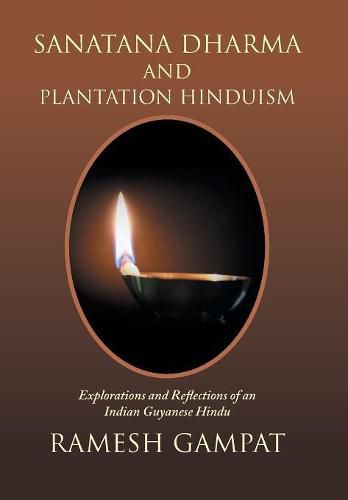Readings Newsletter
Become a Readings Member to make your shopping experience even easier.
Sign in or sign up for free!
You’re not far away from qualifying for FREE standard shipping within Australia
You’ve qualified for FREE standard shipping within Australia
The cart is loading…






This title is printed to order. This book may have been self-published. If so, we cannot guarantee the quality of the content. In the main most books will have gone through the editing process however some may not. We therefore suggest that you be aware of this before ordering this book. If in doubt check either the author or publisher’s details as we are unable to accept any returns unless they are faulty. Please contact us if you have any questions.
The share of Hindus in Guyana’s Indian population declined from 83.5 percent in 1880 to 62.8 percent in 2012. Yet even a casual observer would conclude that Guyanese Hindus, at home and in the diaspora, are a very religious people. Many of us do a jhandi or havan once annually; others do the more elaborate and costlier yajna, where everyone is welcome, once or twice in their lifetime. Most of us do a short daily puja-prayers, offerings, reading the stras and listening to bhajan-in our homes. Christian missionaries worked assiduously to convert immigrants. Their first order of business was to denigrate Hinduism, designate Hindus as heathens, and disparage their culture, food, and even attire. Immigrants stubbornly resisted, led by the tiny educated elite, including Brhmaas, whom we call Brahmins. Conversion was a failure, at least up to the end of the nineteenth century, but picked up momentum thereafter. From around the 1870s, there occurred an unplanned movement toward a synthesis that brought Hindus, regardless of caste or sect, under a unitary form of Hinduism. Guyanese Hindus call it Sanatana Dharma and Ramesh Gampat labels it Plantation Hinduism in this book. The book argues that the brand of Hinduism practiced is inconsistent with Sanatana Dharma, called Vednta by the more philosophically inclined. It features an extraordinary dependence upon purohits (pandits), which has anaesthetized the Hindu mind and render it unable to think, question, and inquire when it comes to dharma. Rituals and bhakti have been degraded and turned into desire-motivated worship. Devats have been misconstrued as Brahman rather than as limited manifestation of the one nondual pure consciousness. Belief in the multiplicity of gods encourages image worship, and superstitions anchor Guyanese Hindus to tradition and mere belief. Plantation Hinduism is little more than desire-motivated actions, dogmas, and superstitions. Absent is the idea that Sanatana Dharma is a spiritual science no less scientific than the hard sciences, such as physics and astronomy. The central message of Vednta is the innate divinity of every person and the freedom to realize that divinity through anubhava, direct personal experience of supreme reality.
$9.00 standard shipping within Australia
FREE standard shipping within Australia for orders over $100.00
Express & International shipping calculated at checkout
This title is printed to order. This book may have been self-published. If so, we cannot guarantee the quality of the content. In the main most books will have gone through the editing process however some may not. We therefore suggest that you be aware of this before ordering this book. If in doubt check either the author or publisher’s details as we are unable to accept any returns unless they are faulty. Please contact us if you have any questions.
The share of Hindus in Guyana’s Indian population declined from 83.5 percent in 1880 to 62.8 percent in 2012. Yet even a casual observer would conclude that Guyanese Hindus, at home and in the diaspora, are a very religious people. Many of us do a jhandi or havan once annually; others do the more elaborate and costlier yajna, where everyone is welcome, once or twice in their lifetime. Most of us do a short daily puja-prayers, offerings, reading the stras and listening to bhajan-in our homes. Christian missionaries worked assiduously to convert immigrants. Their first order of business was to denigrate Hinduism, designate Hindus as heathens, and disparage their culture, food, and even attire. Immigrants stubbornly resisted, led by the tiny educated elite, including Brhmaas, whom we call Brahmins. Conversion was a failure, at least up to the end of the nineteenth century, but picked up momentum thereafter. From around the 1870s, there occurred an unplanned movement toward a synthesis that brought Hindus, regardless of caste or sect, under a unitary form of Hinduism. Guyanese Hindus call it Sanatana Dharma and Ramesh Gampat labels it Plantation Hinduism in this book. The book argues that the brand of Hinduism practiced is inconsistent with Sanatana Dharma, called Vednta by the more philosophically inclined. It features an extraordinary dependence upon purohits (pandits), which has anaesthetized the Hindu mind and render it unable to think, question, and inquire when it comes to dharma. Rituals and bhakti have been degraded and turned into desire-motivated worship. Devats have been misconstrued as Brahman rather than as limited manifestation of the one nondual pure consciousness. Belief in the multiplicity of gods encourages image worship, and superstitions anchor Guyanese Hindus to tradition and mere belief. Plantation Hinduism is little more than desire-motivated actions, dogmas, and superstitions. Absent is the idea that Sanatana Dharma is a spiritual science no less scientific than the hard sciences, such as physics and astronomy. The central message of Vednta is the innate divinity of every person and the freedom to realize that divinity through anubhava, direct personal experience of supreme reality.